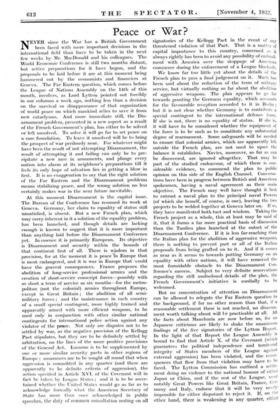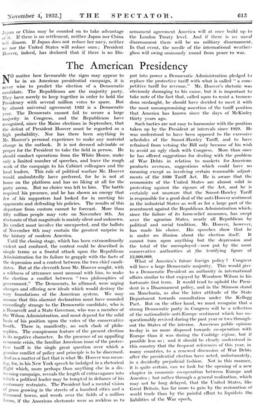Peace or War?
NEVER since the War has a British Government been faced with more important decisions in the international field than have to be taken in the next few weeks by Mr. MacDonald and his colleagues. The World Economic Conference is still two months distant, but active preparations for it have begun, and the proposals to be laid before it are at this moment being hammered out by the economists and financiers at Geneva. . The Far Eastern question, which comes before the League of Nations Assembly on the 14th of this month, involves, as Lord Lytton pointed out forcibly in our columns a week ago, nothing less than a decision on the survival or disappearance of that organization of world peace on which mankind relies to save it from new cataclysms. And more immediate still, the Dis- armament problem, presented in a new aspect as a result of the French Government's plan, has either to be solved or left unsolved. To solve it will go far to set peace on a sure foundation. To leave it unsolved will be to bring the prospect of war perilously near. For whatever might have been the result of not attempting Disarmament, the result of attempting it and failing can only be to pre- cipitate a new race in armaments, and plunge every nation into alarm at its neighbour's preparations till it feels its only hope of salvation lies in getting a blow in first. It is no exaggeration to say that the right solution of the Far Eastern and the Disarmament problems means stabilizing peace, and the wrong solution no less certainly makes war in the near future inevitable.
At this moment Disarmament is the capital issue. The Bureau of the Conference has resumed its work at Geneva. Germany, her claim to equality of status still unsatisfied, is absent. But a new French plan, which may carry inherent in it a solution of the equality problem, has been launched, and though details are lacking enough is known to suggest that it is more important than anything laid before the Disarmament Conference yet. In essence it is primarily European. Its objective is Disarmament and security within the bounds of that continent first of all. There is wisdom in that provision, for at the moment it is peace in Europe that is most endangered, and it is war in Europe that -i-ould have the gravest consequences. France proposes the abolition of long-service professional armies and the creation of short-service conscript forces—possibly with as short a term of service as six months—for the metro- politan (not the colonial) armies throughout Europe, except in Great Britain ; the abolition of all semi- military forces ; and the maintenance in each country of a small special contingent, more highly trained and apparently armed with more efficient weapons, to be used only in conjunction with other similar national contingents for international police action against any violator of the peace. Not only are disputes not to be settled by war, as the negative provision of the Kellogg Pact stipulates, but they are to be definitely settled by arbitration, on the lines of the more positive provisions of the General Act. Locarno is to be supplemented by one or more similar security pacts in other regions of Europe ; assurances are to be sought all round that when aggression is committed in any quarter (and there are apparently to be definite criteria of aggression), the action specified in Article XVI. of the Covenant will in fact be taken by League States ; and it is to be ascer- tained whether the United States would go as far as to acknowledge formally what the American Secretary of State has more than once acknowledged in public speeches, the duty of common consultation resting on all signatories of the Kellogg Pact in the event of any threatened violation of that Pact. That is a matter of capital importance to this country, concerned as it always rightly has been to avoid any possibility of embroil- ment with America over the stoppage of American commerce during the enforcement of a League blockade.
We know far too little yet about the details of the French plan to pass a final judgement on it. Much has been said about the reduction of .the term of military service, but virtually nothing so fat about the abolition of aggressive weapons. The plan appears to go far towards granting the Germans equality, which accounts for the favourable reception accorded to it in Berlin ; but it is not clear whether Germany is to contribute a special contingent to the international defence force. If she is not, there is no equality of status. If she is, it will have to be considered whether the equipment of the force is to be such as to constitute any substantial degree of rearmament. Some safeguards will be needed to ensure that colonial armies, which are apparently left outside the French plan, are not used to upset the balance it establishes. Navies, moreover, so far as can be discovered, are ignored altogether. That may be part of the studied endeavour, of which there is con- siderable evidence, to commend the plan to public opinion on this side of the English Channel. Conversa- tions have been in progress between British and American spokesmen, having a naval agreement as their main objective. The French may well have thought it best to entrust a naval plan to the principal naval Powers (of which she herself, of course, is one), leaving the two projects to be welded together at Geneva later on. If so, they have manifested both tact and wisdom. Taking the French project as a whole, this at least may be said of it, that it forms a far more practical basis of discussion than the Tardieu plan launched at the outset of the Disarmament Conference. If it is less far-reaching than the Italian plan for the abolition of aggressive weapons, there is nothing to prevent part or all of the Italian proposals from being grafted on to it. And if it comes as near as it seems to towards putting Germany on an equality with other nations, it will have removed the most formidable obstacle to the Disarmament Con- ference's success. Subject to very definite reservations regarding the still undisclosed details of the plan, the French Government's initiative is cordially to be welcomed.
But no concentration of attention on Disarmament can be allowed to relegate the Far Eastern question to the background, if for no other reason than that, if a reasonable settlement there is not reached, no disarma- ment worth talking about will be practicable at all. All the facts about Manchuria are now before us, for no Japanese criticisms are likely to shake the unanimous findings of the five signatories of the Lytton Report. In the light of that Report the League Assembly is bound to find that Article X. of the Covenant (which guarantees the political independence and territorial integrity of States members of the League against external aggression) has been violated, and the conse- quences that flow from that violation may have to be faced. The Lytton Commission has outlined a settle- ment doing no violence to the national honour of either Japan or China, and if the rest of the League, most notably Great Powers like Great Britain, France, Ger- many and Italy, endorse that it will be very nearly impossible for either disputant to reject it. If, on the other hand, there is weakening in any quarter, either Japan or China may be counted on to take advantage of it. If there is no settlement, neither Japan nor China will disarm. If Japan does not reduce her navy, neither we nor the United States will reduce ours ; President Hoover, indeed, has declared that if there is no Dis- armament agreement America will at once build up to the London Treaty level. And if there is no naval disarmament there will be no military disarmament. In that event, the needle of the international weather- glass will swing ominously round from peace to war.











































 Previous page
Previous page